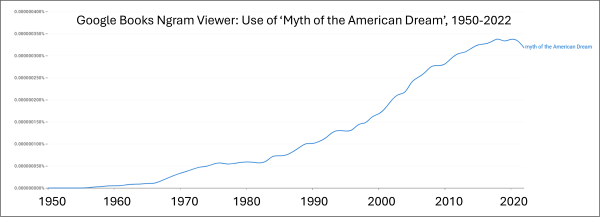The inspiration for this post was reading this comment on an opinion piece in the National Review:
[There is a] “lack of upward mobility in current American society. 40 or 50 years ago the expectation was, if you worked hard, went to college, paid your dues, you would be rewarded, advance and perhaps achieve a higher level of income and status than your parents. That whole dynamic has stalled, kids spend fortunes on educations which they cannot recoup, and the outlook for advancement has become grim, except for a chosen few. Anyone who has kids in their 20's and 30's should grasp this intuitively.”
The above sentiments are commonplace in the US; I’ve been exposed to them in conversation and online for decades, especially since the Great Recession. Are they valid complaints?
Over the next month or so I’ll be addressing that very question, specifically the following propositions:
There is little upward mobility in America.
It is unrealistic to expect hard work and a college education will eventually lead to higher income and status.
Kids spend fortunes on educations which they cannot recoup.
The outlook for advancement has become grim, except for a chosen few
But first, a little history.
James Truslow Adams is credited with coining the phrase ‘American Dream’ in his 1931 bestseller The Epic of America. Adams provided several definitions in his book, including “a dream of a better, richer and happier life for all our citizens of every rank” and “that dream of a land in which life should be better and richer and fuller for everyone, with opportunity for each according to ability or achievement.”
Google’s database of 5.2 million books finds a few earlier mentions of the phrase, beginning in the late 1920s, although usage didn’t really take off until the 1960s:
What also took off in the 1960s was the phrase “myth of the American Dream”:
None of this means the American people as a whole had lost faith in the American Dream. A decade ago, the Dream was alive and well:
“Overall, the public thinks freedom of choice in how to live one’s life (77%) and a good family life (70%) are essential components of the American Dream. A somewhat smaller majority (60%) also says that the ability to retire comfortably is essential to how they think about the American Dream. About half or fewer say making valuable contributions to their community (48%), owning a home (43%) or having a successful career (43%) are essential. And just 11% think becoming wealthy is essential to their understanding of the American Dream. [Over 80% of respondents] say either that their family has achieved, or is on their way to achieving, the American Dream.” - Pew Research Center, “Political Typology Reveals Deep Fissures on the Right and Left”2/ pp. 37-38, October 2017
More recently, however, faith in the American Dream seems to have faded. For example, a 2023 survey included the question, Do you think the American Dream--that if you work hard you'll get ahead --still holds true, never held true, or once held true but does not anymore? The responses:
Still holds true: 36%
Never held true: 18%
Once held true but not anymore: 45%
Now that’s depressing.

